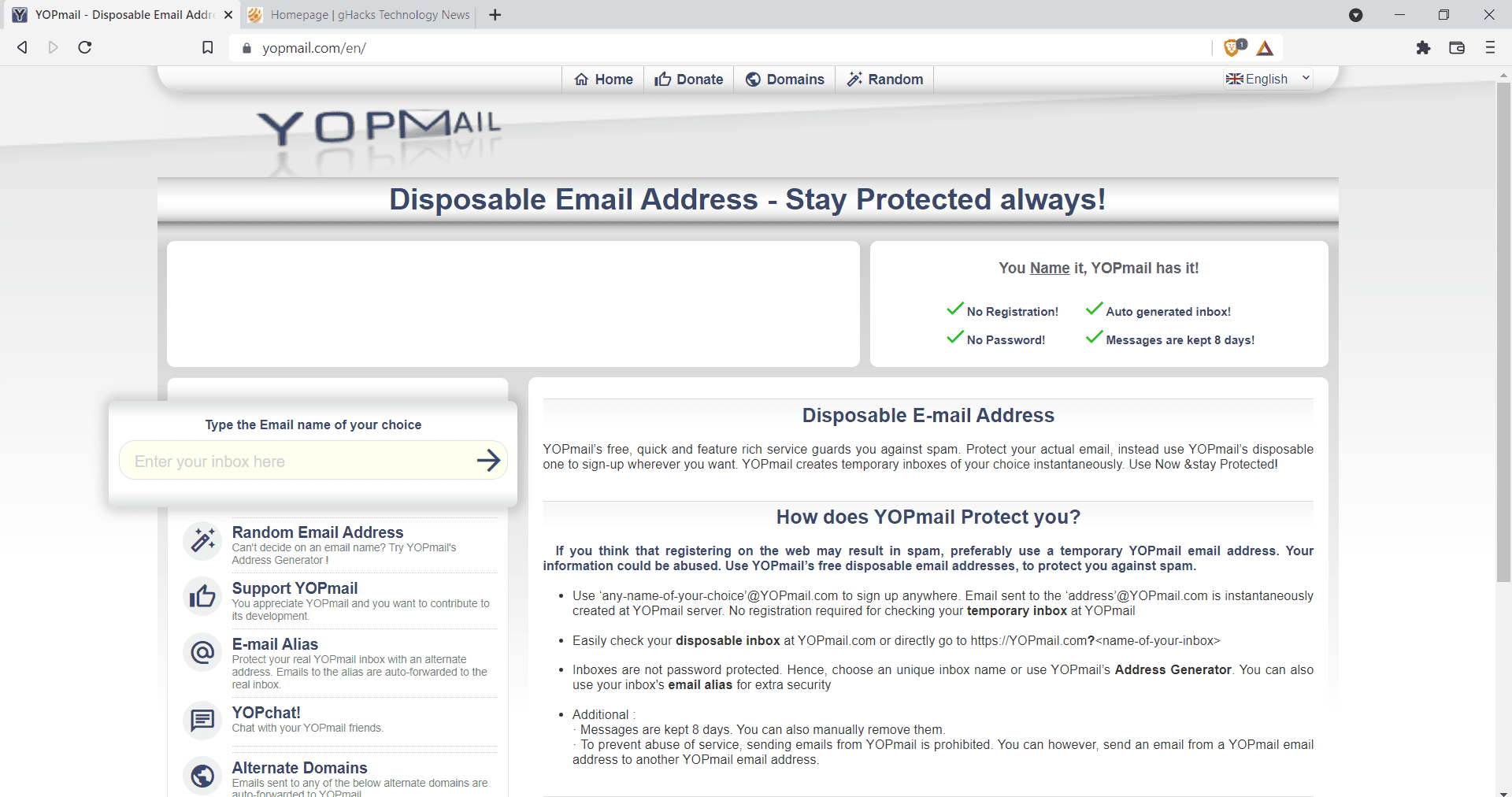In a world, in which more spam is send out day after day than regular emails, it is mostly up to the individual user to do something about it. Receiving less spam in the inbox means less time wasted on it, and also less of a chance to interact with spam. One way of dealing with spam is through disposable email services.
Most Internet users have one or multiple email addresses. While many new users who use the Internet on mobiles exclusively may not use email much, the majority of computer users have one or multiple email addresses they use daily.
These email addresses have value for spammers and marketers, as they can use automation to send unsolicited emails to them. Many will be blocked by spam filters and many more will be ignored, but spam slips through, and since spam is a game of numbers, it is profitable.
One of the best defenses against spam is to keep email addresses secret; this does not always work, as it may be sold by services that you signed-up to, may leak on the Internet when a service gets hacked, or may be revealed by contacts of yours, e.g., when uploading their entire contacts list to a service or getting their computers hacked.
Disposable email addresses, such as Yopmail, as well as email relay services, such as Firefox Relay or AnonAddy, offer a useful line of defense. Basically, what they do is protect the original email address of a user with one they provide. Emails do get relayed through the services, similarly to how VPN connections relay Internet traffic through their servers to protect a user’s IP address.
The use of multiple email addresses is an alternative, but it is usually not possible to create hundreds of email addresses. If you have access to a domain name and email services, you may be able to create multiple email addresses and use them.
Some providers support filters, e.g., Gmail or Outlook supports filters, which change the email address by allowing users to add text to it, but these are easily filtered out by services on the Internet and not usable in all situations.
The benefits of disposable email addresses
If used correctly, the original email address is not revealed to services or contacts. You sign-up using the disposable email address and all communication takes place between the email address and the provider of the service. Relay services forward the emails to your “real” email address.
Many disposable email providers support the creation of several email addresses. You could use one per service on the Internet that you sign-up for, which also helps identify services that sell email addresses or leaked them otherwise. It is easy enough to block or delete created email addresses to stop the flow of spam.
The selection of the provider is essential. Many free services come and go quickly, and it may be more beneficial to sign-up for a paid service instead. Commercial providers include Spamex, Firefox Relay, or 33Mail.
The drawbacks of using disposable email addresses
Organizations that operate disposable email address and relay services need to be trusted. All email communication flows through their servers, which means, that the emails are readable, unless protected.
Some email services give users access to the entire pool of addresses, which means that anyone who happens to check the inbox of a particular email address may read all incoming messages. Deleting emails once read or using providers that give unique disposable email addresses are options to deal with that.
Another disadvantage is that services may be blacklisted, so that the email domains they support may not be used to sign-up for services on the Internet; this too can be overcome in some cases. Some providers give you access to multiple domain names, others allow you to set up your own custom domain names.
Email providers may go out of business, which may be problematic for users, depending on how the service was used. If you used it to sign-up for services on the Internet, you may have lost your ability to recover your passwords or account access.
Closing Words
Disposable email addresses and email forwarding & relay services offer a useful services to Internet users. The may protect a user’s email address and privacy, if used correctly. Whether it is better to use free or paid services is up for debate. Free services generate revenue through ads and sometimes also donations, paid services through subscription fees.
Now You: do you use disposable email services or relay services? If so which, and why?
Summary

Article Name
Benefits and Downsides of using disposable email services
Description
Disposable email services, email relay and forwarding services, aim to protect your email address. Here are the main benefits and disadvantages of using these services.
Author
Martin Brinkmann
Publisher
Ghacks Technology News
Logo

Advertisement





